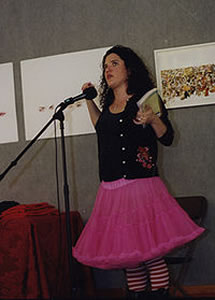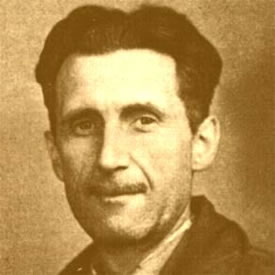De Oostenrijkse dichteres Ingeborg Bachmann werd geboren op 25 juni 1926 in Klagenfurt. Zie ook mijn blog van 25 juni 2006 en ook mijn blog van 25 juni 2007 en ook mijn blog van 25 juni 2008 en ook mijn blog van 25 juni 2009.
Beim Hufschlag der Nacht
Beim Hufschlag der Nacht, des schwarzen Hengstes vorm Tor,
zittert mein Herz noch wie einst und reicht mir den Sattel im Flug,
rot wie das Halfter, das Diomedes mir lieh.
Gewaltig sprengt der Wind mir auf dunkler Straße voran
und teilt das schwarze Gelock der schlafenden Bäume,
daß die vom Mondlicht nassen Früchte
erschrocken auf Schulter und Schwert springen,
und ich schleudre
die Peitsche auf einen erloschenen Stern.
Nur einmal verhalt ich den Schritt, deine treulosen Lippen zu
küssen, schon fängt sich dein Haar in den Zügeln,
und dein Schuh schleift im Staub.
Und ich hör deinen Atem noch
und das Wort, mit dem du mich schlugst.
Im Zwielicht
Wieder legen wir beide die Hände ins Feuer,
du für den Wein der lange gelagerten Nacht,
ich für den Morgenquell, der die Kelter nicht kennt.
Es harrt der Blasbalg des Meisters, dem wir vertrauen.
Wie die Sorge ihn wärmt, tritt der Bläser hinzu.
Er geht, eh es tagt, er kommt, eh du rufst, er ist alt
wie das Zwielicht auf unsren schütteren Brauen.
Wieder kocht er das Blei im Kessel der Tränen,
dir für ein Glas – es gilt, das Versäumte zu feiern –
mir für den Scherben voll Rauch – der wird überm Feuer geleert.
So stoß ich zu dir und bringe die Schatten zum Klingen.
Erkannt ist, wer jetzt zögert,
erkannt, wer den Spruch vergaß.
Du kannst und willst ihn nicht wissen,
du trinkst vom Rand, wo es kühl ist
und wie vorzeiten, du trinkst und bleibst nüchtern,
dir wachsen noch Brauen, dir sieht man noch zu !
Ich aber bin schon des Augenblicks
gewärtig in Liebe, mir fällt der Scherben
ins Feuer, mir wird er zum Blei,
das er war. Und hinter der Kugel
steh ich, einäugig, zielsicher, schmal,
und schick sie dem Morgen entgegen.
Fall ab, Herz
Fall ab, Herz vom Baum der Zeit,
fallt, ihr Blätter, aus den erkalteten Ästen,
die einst die Sonne umarmt‘,
fallt, wie Tränen fallen aus dem geweiteten Aug!
Fliegt noch die Locke taglang im Wind
um des Landgotts gebräunte Stirn,
unter dem Hemd preßt die Faust
schon die klaffende Wunde.
Drum sei hart, wenn der zarte Rücken der Wolken
sich dir einmal noch beugt,
nimm es für nichts, wenn der Hymettos die Waben
noch einmal dir füllt.
Denn wenig gilt dem Landmann ein Halm in der Dürre,
wenig ein Sommer vor unserem großen Geschlecht.
Und was bezeugt schon dein Herz?
Zwischen gestern und morgen schwingt es,
lautlos und fremd,
und was es schlägt,
ist schon sein Fall aus der Zeit.

Ingeborg Bachmann (25 juni 1926 – 17 oktober 1973)
Hier met de componist Hans Werner Henze, 1965 in Berlijn
De Amerikaanse schrijver, columnist en homoactivist Larry Kramer werd geboren in Bridgeport, Connecticut op 25 juni 1935. Zie ook mijn blog van 25 juni 2009.
Uit: Queer Conscience
„Gay life in 1970 was very bleak, compartmentalized. You didn’t take it to work. You had to really lead a double life. There were bars, but you sort of snuck in and snuck out. Activism and gay pride simply didn’t exist. I don’t even think the word gay was in existence. We weren’t quite gay people yet, and we certainly weren’t a people. We were isolated individuals.
I think the Continental Baths changed things more than Stonewall did. The same with Fire Island Pines; everybody there was walking around half-naked and having fun. It was clean. It was a party. There was also a place called the Everard Baths, which was the bath. It was hideous, like Kafka. There were wire-mesh walls, and the floors were filthy and stank, whereas the Continental Baths were like ancient Greece. They were clean, and you could talk to people, and Bette Midler sang to you. But the Continental Baths were like a candy store. It’s hard to say no. Everybody I knew wanted to fall in love, but nobody was falling in love, or if they did, it was for ten minutes. Everybody was having so much sex that no relationship in the world could withstand all of that. We didn’t know it was bad. We didn’t know that it would be physically debilitating. And of course, drugs came along. And also peer pressure said anything and everything was okay. We didn’t have a political movement then. Sex wasn’t a political act. It was just pure and simple exuberant hedonism. Very understandable after centuries of being locked up. But I found that having so much sex made finding love impossible.
People think I’m totally anti-sex, and that simply isn’t true. I think the thing that upsets me is that a few gay men make sex their total be-all and end-all — we have so much more to our lives than just carnality. And that’s why we’ve never had strong political organizations, why we don’t have power, why we didn’t have a place at the table. I so desperately want to redefine homosexuality as something more than just sex.“

De Amerikaanse schrijfster en journaliste Ariel Gore werd geboren op 25 juni 1970 in Carmel, Californië. Zie ook mijn blog van 25 juni 2009.
Uit: Atlas of the Human Heart
„They say that back back back, before I was born, people actually believed the stories they told themselves. This may be true, but no one can prove it.
I’ll tell you where I came from: northern California. A peninsula surrounded by the sea. Water and more water. The second illegitimate daughter of intuition and paranoia. Tide pool hermit crab, fierce and private. Vulnerable belly. Destined for lifelong homelessness, squatting, outgrowing shells, searching for new ones, hitchhiking with anemones. Of the ocean, but terrestrial.
I was still an infant when my bio-dad realized he was cracking up. Maybe it was just the time, he told himself. He’d been trying to edit the Merry Pranksters’ bus trip video, but there was nothing in it worth saving. My sister’s birth had coincided neatly with the “hippie funeral” in Golden Gate Park. And now Hendrix and Joplin. The Manson trial just heating up. Genocide and rumors of genocide. Everything that wasn’t dead seemed crazy. Or maybe it was the place. The Monterey Peninsula with its high levels of seismic activity and thick fog of memories. The time and the place. There’s always hoping, anyway. So my bio-dad packed us up–two kids and common law-wife-and we spent long months chasing sanity from California to Devon, England; Devon, England, to central London; central London to Amsterdam; Amsterdam to Montparnasse; Montparnasse to the French countryside, where my bio-dad decided that my mother was an Iranian spy and locked us all in a little stone house until I learned to walk and talk and my sister learned to count in French and my bio-dad gave up on his runaway sanity and my mother gave up on him and we escaped, flew home to California.
That’s what I’m told, anyway. And the pretty green and blue entrance and exit visas stamped in my baby passport would tend to substantiate the story.
Stories. Patterns from scraps. This one’s a work of fiction, meaning it’s about 76 percent true. Or it’s a memoir, meaning it’s about 76 percent false. Maybe it should have been a Choose Your Own Adventurebook: …“

Ariel Gore (Carmel, 25 juni 1970)
De Canadese schrijver Michel Tremblay werd geboren in Quebec op 25 juni 1942. Zie ook mijn blog van 25 juni 2009.
Uit: Assorted Candies for the Theatre (Vertaald door Linda Gaboriau)
« NANA : A dollar! You dare come ask me for a dollar to buy twenty Chinese kids a few days before Christmas! Do you realize what a dollar means to us? Do you? Do the brothers and the sisters realize what it means to us? I can feed a household of twelve people with a dollar, Michel! I can produce a feast with a dollar! A wedding banquet! / THE NARRATOR : Don’t exaggerate! / NANA : You’d be surprised what I can do with one measly dollar, young man! There are days when it’s a miracle what shows up in your plate, for the price I paid! You can go see that teaching brother who smelled to high heaven at the last parent-teachers meeting, and tell him that your mother is going to feed her own children before she buys you some Chinese kids for Christmas, even if they’re on sale! »

Michel Tremblay (Quebec, 25 juni 1942)
De Britse schrijver George Orwell (pseudoniem van Eric Arthur Blair) werd op 25 juni 1903 geboren in Motihari, India. Zie ook mijn blog van 25 juni 2006 en ook mijn blog van 25 juni 2007 en ook mijn blog van 25 juni 2008 en ook mijn blog van 25 juni 2009.
Uit: 1984
„Behind Winston’s back the voice from the telescreen was still babbling away about pig iron and the overfulfillment of the Ninth Three Year Plan. The telescreen received and transmitted simultaneously. Any sound that Winston made, above the level of a very low whisper, would be picked up by it; moreover, so long as he remained within the field of vision which the metal plaque commanded, he could be seen as well as heard. There was of course no way of knowing whether you were being watched at any given moment. How often, or on what system, the Thought Police plugged in on any individual wire was guesswork. It was even conceivable that they watched everybody all the time. But at any rate they could plug in your wire whenever they wanted to. You had to live – did live, from habit that became instinct-in the assumption that every sound you made was overheard, and, except in darkness, every movement scrutinized.
Winston kept his back turned to the telescreen. It was safer; though, as he well knew, even a back can be revealing. A kilometer away the Ministry of Truth, his place of work, towered vast and white above the grimy landscape. This, he thought with a sort of vague distaste, this was London, chief city of Airstrip One, itself the third most populous of the provinces of Oceania. He tried to squeeze out some childhood memory that should tell him whether London had always been quite like this. Were there always these vistas of rotting nineteenth-century houses, their sides shored up with balks of timber, their windows patched with cardboard and their roofs with corrugated iron, their crazy garden walls sagging in all directions? And the bombed sites where the plaster dust swirled in the air and the willow herb straggled over the heaps of rubble; and the places where the bombs had cleared a larger path and there had sprung up sordid colonies of wooden dwellings like chicken houses? But it was no use, he could not remember: nothing remained of his childhood except a series of bright-lit tableaux, occurring against no background and mostly unintelligible.
The Ministry of Truth-Minitrue, in Newspeak-was startlingly different from any other object in sight. It was an enormous pyramidal structure of glittering white concrete, soaring up, terrace after terrace, three hundred meters into the air. From where Winston stood it was just possible to read, picked out on its white face in elegant lettering, the three slogans of the Party:
WAR IS PEACE
FREEDOM IS SLAVERY
IGNORANCE IS STRENGTH.“

George Orwell (25 juni 1903 – 21 januari 1950)
Zie voor nog meer schrijvers van de 25e juni ook mijn vorige blog van vandaag.
